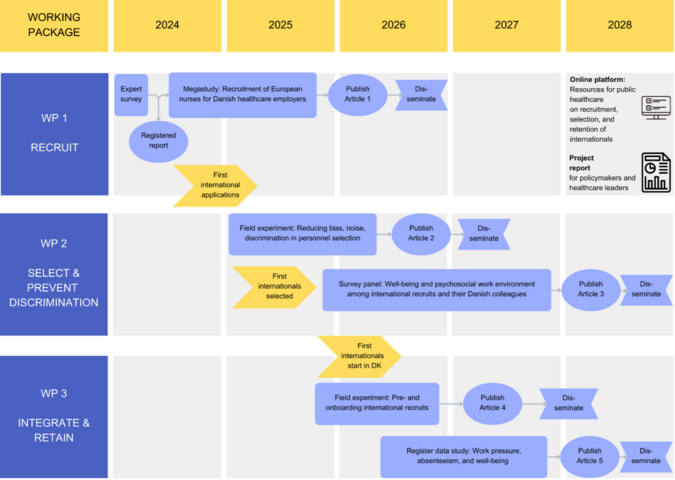
Like in most western countries, the Danish healthcare sector is facing a recruitment crisis, especially for nursing staff. There is a need to look beyond Denmark's borders to find the necessary workforce.
The central research question is: How to sustainably recruit, select and retain qualified international healthcare professionals?
The MORE project aims to conduct three ambitious field experiments. The first is a so-called mega-study targeting up to 100,000 potential applicants from Denmark’s European neighboring countries for jobs in the public healthcare sector. We contact these candidates and follow them through application, selection and hiring to understand how public healthcare workplaces can implement effective, fair and sustainable recruitment. The MORE project will run from 2024-2028.
The project consists of three working packages (WP):
WP1 will focus on international recruitment and apply the recent megastudy approach (Milkman et al., 2021). We establish a partnership with Danish public health organizations to conduct a massive field experiment (n = ca. 100,000 European nursing employees). The megastudy approach allows simultaneous evaluation and comparison of the effectiveness of ten different interventions on objective outcome measures (e.g., interest in a job, qualified applications). The text of the interventions is based on a cross-disciplinary literature review as well as an approach co-designed with recruitment practitioners. Experts are asked to rate what they expect is the best-performing intervention.
WP2 will focus on measuring and reducing discrimination in personnel selection. Discrimination in the hiring process hinders individuals from achieving their full potential in the labor market, which results in a net loss for both the individual and society. Complementing WP1, WP2 will measure discrimination and test interventions to reduce biases in personnel selection. Research knows little about which interventions might counter potential biases and help to break prejudices. In a field experimental approach, we test interventions during the personnel selection of international to understand how to reduce biases, noise, and discrimination in personnel selection.
WP3 will focus on effective onboarding, integration, and retainment of international employees. We build on the literature on organizational socialization and suggest that retention starts well before onboarding. We expect that successful retention of the international workforce starts already with preboarding before the first day at work. This can be achieved, for example, through interventions related to both new employees and employers. WP3 conducts a third field experiment to test the effects of preboarding interventions for international recruits. Further, we follow the international recruits with register data research.
A simplified visualization of the 5-year project:

The project is led by Christian Bøtcher Jacobsen. He is particularly responsible for work package three, which focuses on workplace attachment and collaboration between foreign and Danish healthcare workers.
Co-lead is Florian Keppeler, who as assistant professor is responsible for the first work package on the topic of recruitment. Diana Galos, Assistant Professor at the University of Copenhagen and affiliate at the Center for Experimental-Philosophical Studies of Discrimination (CEPDISC), Aarhus University, is responsible for the second work package on personnel selection.
Niels Højberg, management expert and advisor at the center, is the head of the project's Advisory Board.
The international research partner, The People Lab at Harvard Kennedy School, is represented by Elizabeth Linos, Emma Bloomberg Associate Professor of Public Policy and Management, and Brenda Sciepura, Research Fellow at The People Lab.

The project's key implementation partner is Copenhagen Capacity, in particular Marianne Lund Danling.

The project is supported by the Carlsberg Foundation (grant CF23-1514).

The project sets up a network of researchers on the topical area of recruitment, selection, and retention of international workforce. The network will serve as a platform for exchange of knowledge and experiences regarding sustainable international workforce policies with focus on the healthcare context.
The ambition is to drive a joint research agenda on international hiring in the public sector in general and the healthcare sector in particular. This also includes setting up of international research symposia, the launch of further joint research initiatives and further applications for international research funding.
In addition to the named partners, the following researchers are part of the network (will be regularly updated).
Aiofe McDermott, Professor, Aston Business School
Alexander Coppock, Associate Professor, Department of Political Science, Yale University
Ariane Bertogg, Postdoctoral Fellow, University of Konstanz
Claire Maxwell, Professor, Copenhagen University
Johan Simonsen Abildgaard, Associate Professor, Copenhagen Business School
Lorenza Micacchi, PhD Student, KPM Center for Public Management, University of Bern
Martha Sif Karrebæk, Professor, Copenhagen University
Martin Sievert, Assistant professor, Leiden University
Mogens Jin Pedersen, Associate Professor, Department of Political Science, University of Copenhagen
Sandra Groeneveld, Professor, Chair of the Leiden Leadership Center, Leiden University
